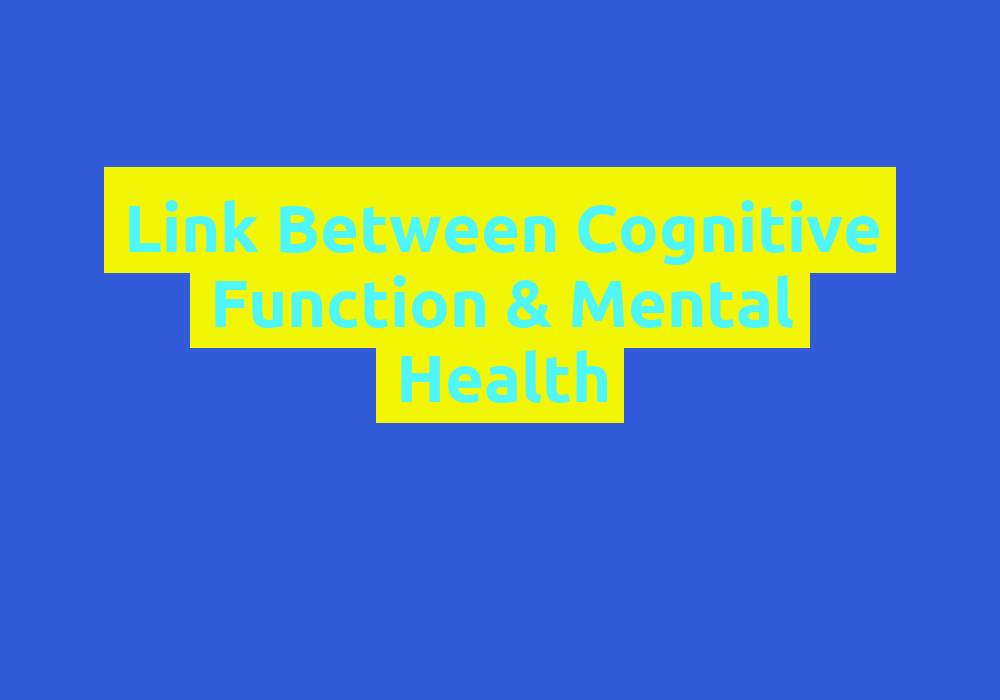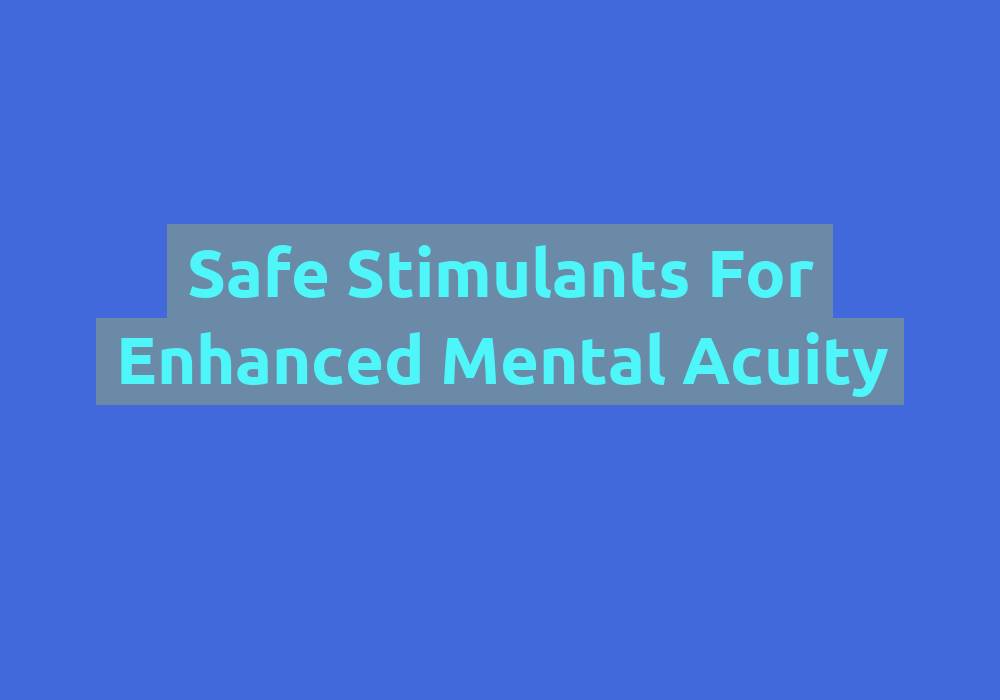Link Between Cognitive Function & Mental Health

In recent years, there has been a growing interest in understanding the link between cognitive function and mental health. Cognitive function refers to the mental processes that allow us to think, learn, remember, and problem-solve. On the other hand, mental health encompasses our emotional, psychological, and social well-being. While these two aspects may seem distinct, research suggests that they are interconnected and influence each other.
Understanding Cognitive Function
Cognitive function encompasses various mental abilities that are crucial for our daily functioning. These abilities include attention, perception, memory, language, reasoning, and problem-solving skills. When our cognitive function is intact, we can process information efficiently, make decisions, and interact with the world around us effectively.
Enhancing cognitive function involves improving and maintaining these mental abilities. Strategies such as practicing mindfulness, engaging in brain training activities, and challenging oneself intellectually can help boost cognitive function. For example, regularly solving puzzles or learning a new language can enhance memory and reasoning skills.
Impact of Mental Health on Cognitive Function
Mental health issues, such as anxiety, depression, and stress, can significantly affect cognitive function. These conditions often manifest in cognitive impairments that disrupt our ability to concentrate, remember information, and make decisions. For example, individuals experiencing depression may struggle with executive functions, such as organizing tasks or maintaining attention.
Moreover, chronic stress can impair working memory, which is crucial for holding and manipulating information in our minds temporarily. This can have detrimental effects on our ability to learn, solve problems, and adapt to new situations. Additionally, anxiety disorders can interfere with attentional processes, making it difficult to focus on relevant information and filter out distractions.
To address the impact of mental health on cognitive function, it is important to prioritize mental well-being. Seeking professional help, such as therapy or counseling, can assist in managing and alleviating mental health conditions. Engaging in stress-reducing techniques, such as progressive muscle relaxation or engaging in hobbies, can also have a positive impact on cognitive function.
The Impact of Cognitive Function on Mental Health
Conversely, cognitive function plays a vital role in our mental health. When our cognitive abilities are impaired, it can lead to difficulties in managing emotions, problem-solving, and coping with stress. For example, individuals with poor cognitive function may struggle to regulate their emotions effectively, leading to increased levels of anxiety or irritability.
Furthermore, cognitive deficits can hinder our ability to find effective solutions to life’s challenges, increasing feelings of frustration and helplessness. This, in turn, can contribute to the development or exacerbation of mental health conditions such as depression.
To enhance cognitive function and improve mental health, it is crucial to engage in activities that promote cognitive stimulation. This can include engaging in intellectually stimulating hobbies, such as reading, puzzles, or learning new skills. Additionally, practicing stress management techniques, such as deep breathing exercises or mindfulness meditation, can help improve cognitive function and overall mental well-being.
Common Factors Influencing Cognitive Function and Mental Health
Several common factors influence both cognitive function and mental health. Understanding these factors can provide valuable insights into improving and maintaining overall well-being:
1. Physical Exercise
Regular physical exercise has been shown to have numerous benefits for both cognitive function and mental health. Exercise increases blood flow to the brain, promotes the release of mood-enhancing neurotransmitters, and stimulates the growth of new neurons. It can also improve cognitive performance by enhancing attention, memory, and executive functions.
Incorporating aerobic exercises, such as running or swimming, into one’s routine can have significant positive effects on cognitive function. These exercises increase oxygen supply to the brain, improving overall brain health. Strength training exercises, on the other hand, can enhance executive functions and working memory.
2. Sleep
Adequate sleep is essential for optimal cognitive function and mental health. During sleep, our brains consolidate information, strengthen memories, and restore cognitive resources. Lack of sleep can lead to difficulties with concentration, memory, and emotional regulation, increasing the risk of mental health problems.
To improve sleep quality, it is important to maintain a consistent sleep schedule and create a relaxing bedtime routine. Avoiding electronic devices before bed, creating a comfortable sleep environment, and practicing relaxation techniques can also contribute to better sleep and enhanced cognitive function.
3. Nutrition
Proper nutrition is crucial for supporting brain health and cognitive function. Certain vitamins, minerals, and omega-3 fatty acids have been linked to improved cognitive performance and reduced mental health issues. A diet rich in fruits, vegetables, whole grains, lean proteins, and healthy fats can provide the necessary nutrients for optimal brain function.
Including foods such as blueberries, leafy greens, fatty fish, nuts, and seeds in the diet can support brain health and cognitive function. These foods are rich in antioxidants, vitamins, and minerals that nourish the brain. Additionally, staying hydrated by drinking an adequate amount of water is essential for optimal cognitive function.
4. Stress Management
Effective stress management techniques, such as mindfulness meditation, deep breathing exercises, or engaging in stress-reducing activities, can positively impact both cognitive function and mental health. By reducing stress levels, individuals may experience improved attention, memory, and emotional well-being.
Incorporating stress management techniques into daily routines can help mitigate the negative effects of stress on cognitive function and mental health. Regular practice of mindfulness meditation, for example, can improve attention and emotional regulation. Engaging in activities that bring joy and relaxation, such as spending time in nature, practicing yoga, or listening to music, can also help reduce stress levels.
5. Social Connection
Maintaining strong social connections and engaging in meaningful relationships can have a significant impact on cognitive function and mental health. Social interaction provides cognitive stimulation, emotional support, and a sense of belonging, all of which contribute to overall well-being.
To enhance social connections, it is important to actively engage in social activities. This can include joining clubs, participating in group activities, or volunteering for community organizations. Additionally, maintaining regular communication with friends and loved ones through phone calls, video chats, or in-person meetings can foster a sense of connection and support cognitive function.
Conclusion
The link between cognitive function and mental health is undeniable. Poor cognitive function can contribute to the development or exacerbation of mental health issues, while mental health problems can impair cognitive abilities. By understanding and addressing the interplay between these two aspects, we can take proactive steps to promote better cognitive function and overall mental well-being. Incorporating lifestyle factors such as exercise, sleep, nutrition, stress management, and social connection can significantly contribute to maintaining a healthy mind and brain.
This article was written by a SEO content writing expert proficient in the English language.
FAQ
1. What is cognitive function?
Cognitive function refers to the mental processes that allow us to think, learn, remember, and problem-solve.
2. How does mental health impact cognitive function?
Mental health issues such as anxiety, depression, and stress can significantly affect cognitive function by impairing concentration, memory, and decision-making abilities.
3. How does cognitive function impact mental health?
Cognitive function plays a vital role in mental health by influencing emotional regulation, problem-solving, and coping with stress. Impaired cognitive abilities can lead to increased levels of anxiety, irritability, and frustration.
4. What are some common factors that influence cognitive function and mental health?
Common factors that influence both cognitive function and mental health include physical exercise, sleep, nutrition, stress management, and social connection. These factors can have a positive impact on both aspects of well-being.
